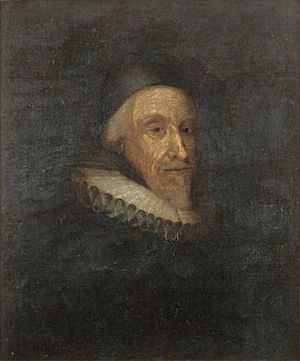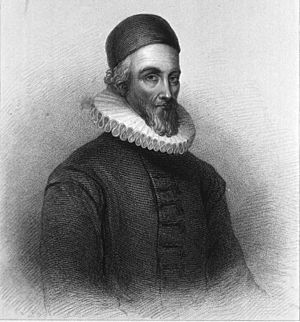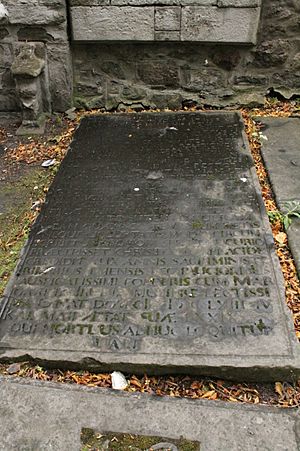Andrew Cant (minister) facts for kids
Quick facts for kids Andrew Cant |
|
|---|---|

Andrew Cant att. to George Jamesone
|
|
| Personal details | |
| Born | 1584 |
| Died | 1663 |
Andrew Cant (1584–1663) was an important Presbyterian minister and a leader of the Scottish Covenanters. The Covenanters were a group of Scots who promised to uphold the Presbyterian Church and their religious freedom. Cant was known for his strong beliefs and brave actions during a time of big changes in Scotland's history.
Around 1623, people in Edinburgh wanted him to be their minister. However, King James I did not approve. Ten years later, he became a minister in Pitsligo in Aberdeenshire. In 1638, he moved to Newbattle in Midlothian.
In July 1638, he traveled to Aberdeen with other leaders. They tried to convince the university and local church leaders to sign the National Covenant. This attempt was not successful. In November of that year, he attended a big meeting in Glasgow. This meeting decided to remove episcopacy (a church system led by bishops) from Scotland.
In 1640, Cant served as a chaplain for the Scottish army. Later, he settled as a minister in Aberdeen. Even though he strongly supported the Covenanters, he was also loyal to the king. He preached to King Charles I in Edinburgh. He also strongly supported bringing back the monarchy during the time of the Commonwealth.
In 1661, some people in his church complained about his strong words. Because of these complaints, he decided to leave his position.
Contents
Andrew Cant's Early Life and School
Andrew Cant was born in 1584. We don't know much for sure about his parents. Some people think he was from Aberdeen. Others believe he was from Haddingtonshire or the Mearns.
He went to the Grammar School. Then he studied at King's College in Aberdeen. He earned his Master of Arts degree in 1612.
Starting His Career
In 1614, Cant became a Humanist at King's College. This was a teaching role. Later, he became a minister in Afford before December 1617. He left this job after October 1629. He then became a tutor for the son of Alexander Forbes, Lord Pitsligo. After that, he became a minister in Pitsligo before November 1633.
His Role in Church and Politics
Andrew Cant worked to gather support against the Service Book in October 1637. The Service Book was a new prayer book that many Scots did not like. He went to Aberdeen with other ministers like Henderson and Dickson to gain support.
Unlike most ministers in Aberdeen, Cant strongly supported the Covenants. He was against the king's efforts to bring back bishops. In July 1638, he was chosen to help bring people in the north to support the Presbyterian cause. He traveled with two other ministers and three noblemen.
The city leaders of Aberdeen met them and offered them a place to stay. But the commissioners refused until they saw if the leaders would sign the Covenant. The "Aberdeen doctors" were famous for being against the Covenant. They asked the commissioners many questions, which led to a long debate. Feelings were so strong that Cant and the others could not preach in Aberdeen's churches. They had to preach outside.
Cant was a member of the important Assembly that met in Glasgow in 1638. After this, he moved to Newbattle as a minister in May 1639. He also served as a chaplain for the Scottish army in Newcastle in 1640. In March 1641, he became a minister at St Nicolas' Church in Aberdeen.
Cant was very strict about following the Covenants. But he was also very loyal to the king. Once, during the time of Cromwell, many English officers were in his church. He spoke very strongly about being loyal to the king. He also spoke about how wrong it was to go against the king. The officers stood up, and some even pulled out their swords. They started to walk towards the pulpit.
Cant, who was very brave, opened his chest and said, "Here is the man who said these things!" He dared them to strike him. Wodrow, who told this story, said that Cant "had once been a captain" and was "one of the most bold and resolute men of his day." His great courage and powerful speeches made him very famous.
Cant was part of all the Assembly Commissions from 1642 to 1649. In 1646, Parliament gave him 2000 merks (a type of money) for his work and losses. Andrew Cant was chosen as the leader, or Moderator, of the General Assembly on July 10, 1650. He joined the "Protesters" group in 1651, taking their side against the "Resolutioners." Cant also became the head, or rector, of King's College in 1651. He may have left his position in 1660.
Death and Lasting Impact
Andrew Cant passed away on April 27, 1663. He is buried in the graveyard of the Kirk of St Nicholas on Union Street in Aberdeen. His grave is a flat stone slab along the west wall. It shows his birth year as 1584.
People described him as the strongest supporter of the National Covenant in northern Scotland. He was a very serious and brave person. In December 1662, he was called before the Privy Council for his strong actions.
Family Life
Andrew Cant married Margaret Irvine. She was buried on March 28, 1679. They had several children:
- James
- Alexander, who became a minister in Banchory-Ternan
- Andrew, who became the Principal of the University of Edinburgh from 1675 to 1685.
- Margaret, who never married and died in 1660.
- Sarah, who married Alexander Jaffray in 1647. She later became a Quaker and died in 1673.
 | Precious Adams |
 | Lauren Anderson |
 | Janet Collins |



